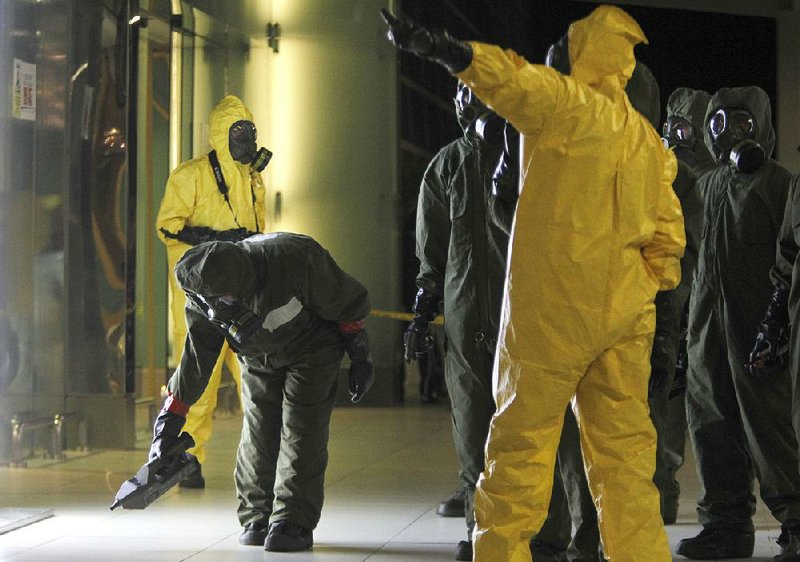KUALA LUMPUR, Malaysia -- Malaysia's health minister said today that autopsy results suggested a nerve agent caused "very serious paralysis" that killed the exiled half brother of North Korea's leader, as police completed a sweep of the budget terminal where he was poisoned and declared it clear of any toxin.
The investigation has unleashed a diplomatic fight between Malaysia and North Korea, which many authorities believe was behind the Feb. 13 killing of Kim Jong Nam at Kuala Lumpur's airport. On Friday, Malaysian police revealed that the banned chemical weapon VX nerve agent was used to kill Kim.
Health Minister Subramaniam Sathasivam said the state chemistry department's finding of the VX toxin confirmed the hospital's autopsy result that suggested a "chemical agent caused very serious paralysis" that led to death "in a very short period of time." The VX agent can lead to death very quickly in high doses, he said.
The killing of Kim took place in the middle of crowds of travelers at Kuala Lumpur's airport and appeared to be a well-planned hit. Kim died on the way to a hospital, within hours of the attack.
Tens of thousands of passengers have passed through the airport since the killing. No areas were cordoned off, and protective measures were not taken. Subramaniam said there have been no reports so far of anyone else being sickened by the toxin.
Late Saturday, however, police said they would begin a sweep of the budget terminal where Kim was attacked to check for traces of VX.
The sweep started about 2 a.m. today and involved officers from the police's chemical, biological, radiological and nuclear teams, as well as the fire department's hazardous-materials unit and the government's atomic energy board. Although VX is not radioactive, police said the radiological team and the atomic energy board were involved as a precaution.
Abdul Samah Mat, the police official leading the investigations, said a two-hour sweep by more than a dozen officers in protective gear detected no hazardous material. He said the budget terminal is "free from any form of contamination of hazardous material" and declared it a "safe zone."
Earlier Saturday, police warned that they would issue an arrest warrant for a North Korean diplomat if he refuses to cooperate with the investigation into the attack.
Experts say the nerve agent used to kill Kim was almost certainly produced in a sophisticated state weapons laboratory and is banned under an international treaty. But North Korea never signed the treaty, and it has spent decades developing a complex chemical-weapons program.
Kim was not an obvious political threat to his estranged half brother, Kim Jong Un. But he may have been seen as a potential rival in North Korea's dynastic leadership, even though he had lived in exile for years. North Korea has denied any role in the attack.
Malaysia said last week that Hyon Kwang Song, a second secretary at the North Korean Embassy in Kuala Lumpur, was wanted for questioning. But authorities acknowledged at the time that he has diplomatic immunity and they couldn't compel him to appear.
On Saturday, Malaysia's tone changed.
Abdul Samah, the police official, said authorities would give the diplomat reasonable time to step forward. "And if he failed to turn up ... then we will go to the next step by getting a warrant of arrest from the court," he told reporters.
Lawyer Sankara Nair, however, noted that diplomats have immunity privileges even in criminal cases. "Police can apply for a warrant, but it can easily be set aside by the embassy," he said.
Malaysia hasn't directly accused the North Korean government of being behind the attack, but officials have said four North Korean men provided two women with poison to carry it out.
The four men fled Malaysia shortly after the killing, while the women -- one from Indonesia and the other Vietnamese -- were arrested.
Abdul Samah said the Indonesian woman, Siti Aisyah, became ill in a taxi on the way from the airport after the attack but was fine now. He said more tests were needed to determine if the two women were given antidotes so the nerve agent wouldn't kill them.
On Saturday, representatives from the Indonesian and Vietnamese embassies in Malaysia met with the two women.
Indonesia's deputy ambassador, Andriano Erwin, told reporters later that Aisyah, 25, said she had been paid the equivalent of $90 for what she believed was a harmless prank. Aisyah said she had been introduced to people who looked like Japanese or Koreans who asked her to play a prank for a reality show, Erwin said.
Asked if she knew what was on her hands at the time of the attack, Erwin said, "She didn't tell us about that. She only said that it's a kind of oil, baby oil, something like that."
An odorless chemical with the consistency of motor oil, VX is an extremely powerful poison, with an amount no larger than a few grains of salt enough to kill.
The Vietnamese woman who was arrested, Doan Thi Huong, also thought she was taking part in a prank, Vietnam's Foreign Ministry said Saturday.
In grainy surveillance footage, the women appear to smear something onto Kim's face before walking away in separate directions. Malaysian police said the attackers knew what they were doing and had been trained to go immediately to the bathroom and clean their hands.
Experts say the women must have taken precautions so the nerve agent wouldn't kill them.
Also Saturday, police confirmed that a raid earlier in the week on a condominium on the outskirts of Kuala Lumpur was part of the investigation. Abdul Samah, the police official, said the condo was rented by the four North Korean suspects who had left the country. He said police were still testing a seized substance for traces of any chemicals.
A Section on 02/26/2017
